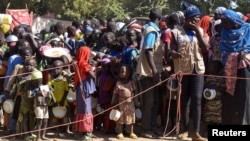Defense ministers and security experts from Cameroon and Chad are meeting in the Cameroonian capital, Yaounde, to map out ways of jointly combating growing security threats along their border.
Officials say a day hardly goes by without cases of either Boko Haram terrorist attacks or cross-border crimes, including armed gangs attacking civilians and wildlife, reported on both sides of the border between Cameroon and Chad.
The two central African states say they share a more than 1,100-kilometer porous land border that facilitates the escape of armed gangs and Boko Haram terrorists to either Cameroon or Chad when chased by government troops.
Joseph Beti Assomo, Cameroon’s defense minister, said Chadian President Mahamat Idriss Deby Itno and his Cameroonian counterpart, Paul Biya, have ordered militaries of the two states to jointly monitor and protect their borders from violence perpetrated by the Islamist radicals and armed gangs.
Assomo said keeping Cameroon and Chad safe from rebels, terrorists and armed gangs is synonymous with contributing to stability in sub-Saharan Africa in particular and Africa in general.
Assomo also said tens of thousands of Cameroonian citizens who fled bloody battles between fishers and herders in northern Cameroon last year are still in Chad.
Chad's government says the displaced persons are refusing to return to their communities in Cameroon because of frequent conflicts between herders and fishers.
Defense ministers from the two countries say the slaughter of elephants in Cameroon, the Democratic Republic of Congo, South Sudan and the Central African Republic by criminal groups such as the Lord’s Resistance Army, the Sudanese Janjaweed militia, and Cameroonian and Chadian poaching gangs has been reduced.
But the proliferation of weapons left behind by rebels continues to be a threat to wildlife and civilians in the two countries, the ministers say.
The ministers say elephants are slaughtered for their ivory, which is in high demand on Asian black markets.
Daoud Yaya Brahim, Chad's defense minister, said Chad and Cameroon have to immediately stop high waves of kidnappings for ransom along their border, end cattle theft and the slaughter of elephants.
What also must stop, Brahim said, is cross-border criminality that continues to be a threat to peace and makes living conditions difficult for civilians who are living on less than a dollar a day. He said socioeconomic development along the Cameroon-Chad border has been highly compromised by rampant insecurity.
Chad and Cameroon say civilians are currently held hostage by armed gangs but did not say how many.
Joseph Vincent Ntuda Ebode is a lecturer in international security and defense at the University of Yaoundé-Soa. He also serves as director of the Yaounde-headquartered Center for Research in Political and Strategic Studies.
Ntuda said he doesn't understand why it has taken up to 10 years for Cameroon and Chad to organize such a high-profile security meeting when Chad needs Cameroon to secure a multibillion-dollar, 1,000-kilometer pipeline that transports oil from the Doba Oil Field in southern Chad to the deep seaport in Kribi, Cameroon, for export.
Ntuda said the Cameroonian government also needs Chad to stop armed gangs, Boko Haram terrorists, militias and rogue units of national armies from Chad, Sudan and the Central African Republic from entering Cameroon.
The defense ministers said they will enact presidential plans to counter these various regional threats.They did not say when they will begin military operations.




